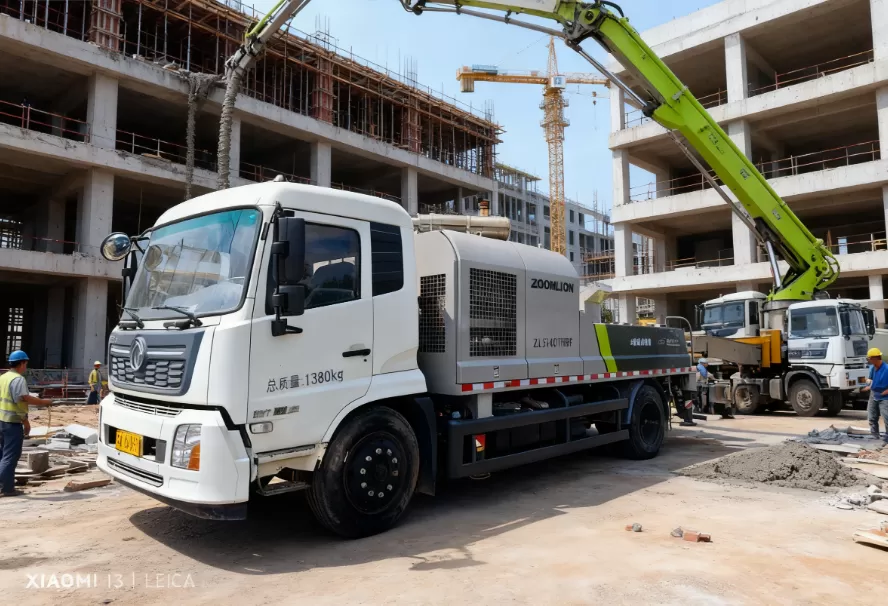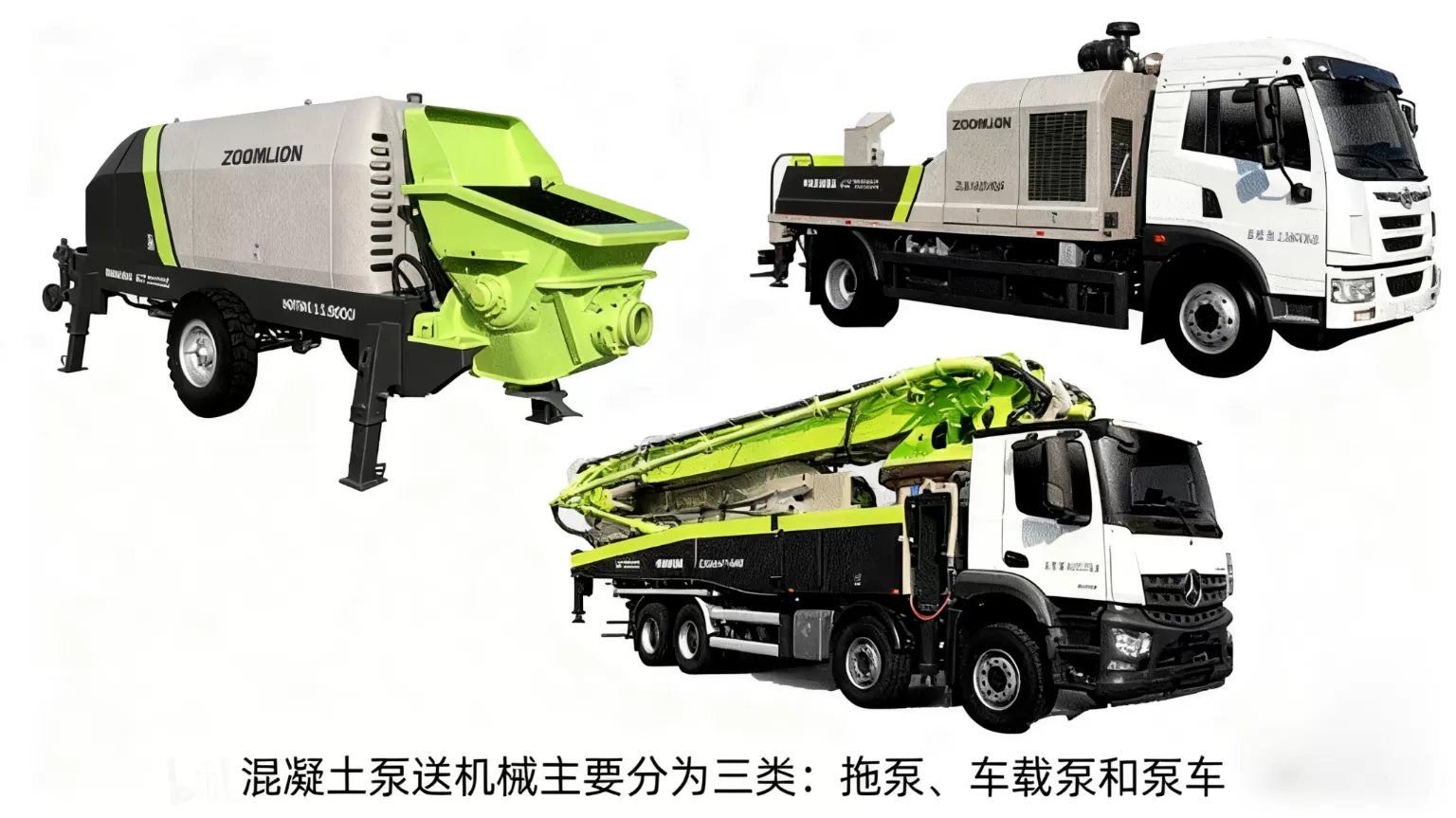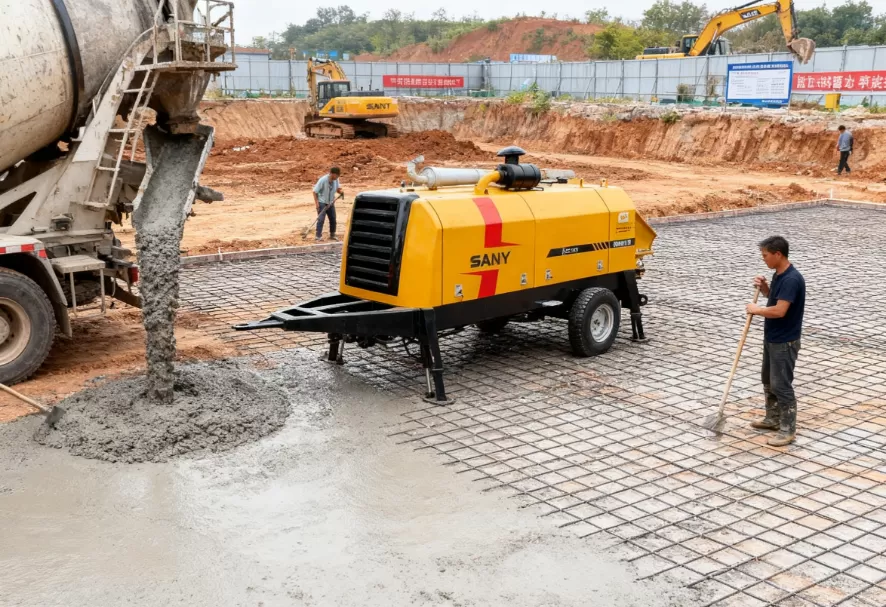Types of Concrete Pumps: From Trailer Pumps to Boom Systems (Full 2025 Guide)
The demand for effective concrete delivery systems in modern construction is still rising. It doesn't matter if it's urban infrastructure or high-rise buildings, the selection of the right concrete pump guarantees accuracy, quickness, and safety in the working area. As an experienced exporter of used construction machinery, the knowledge about all the pump types regarding their structure and function is very important for making the right choice of equipment and considering the resale price. The next classification gives an easy-to-see comparison of standard, extended, and special types that are used in worldwide projects.

Standard Types: The Foundation of Concrete Transport
1. Trailer Pump
Trailer pumps are the most frequent and price-efficient choice for the general construction work. Their working principle consists of being pulled to the site and connecting to a pipeline system. They are famous for long-distance concrete delivery, so their application is widespread in residential buildings, tunnels, and bridges. The lack of a placing boom does not hinder their small size and uncomplicated design, which makes them easy to maintain and move around.
2. Truck-Mounted Pump
Truck-mounted pumps incorporate a vehicle's flexibility with the power of a pumping unit that stays put. These self-propelled pumps are perfect for construction projects of medium height. They tend to be used a lot in housing projects, asphalt paving, and low-rise buildings. They do not have a boom, but the combination of their mobility and efficiency leads to a considerable decrease in the time required for setting up on-site.
3. Boom Pump Truck
Boom pumps come with a hydraulic arm, or boom, that provides the accuracy of high-altitude or long-distance concrete placement. These self-driving machines are very common in extensive projects like the construction of bridges, viaducts, and skyscrapers. Their capacity to access hard-to-reach areas makes them a must-have in today's construction sites.

Extended Types: Specialized for Greater Reach and Height
1. Stationary Placing Boom
For ultra-high-rise projects, a stationary placing boom is the most common choice. This type is fixed and operates independently from a ground pump. It guarantees reliable concrete placement at very high areas where a conventional boom truck cannot reach. The trailer pump and stationary boom together give the highest accuracy in tower construction.
2. Towable Boom Pump
This model offers the combination of being movable and having a long reach. Made for temporary or short-term projects, towable boom pumps can be moved and set up in no time at all. Their main use is in road repair, bridge rehabilitation, and little construction projects where fast setup and adaptability are needed.
Special Types: Compact, Versatile, and Site-Friendly
Secondary Structure Pump
A secondary structure pump is another name for this kind of pump. It is a portable pump which is specially meant for the interior or confined-space operations. It is one of the most common applications for secondary pouring work in floors, basements, and indoor heating projects. Being light-weight, it is very easy to move from one floor to another thus providing efficient concrete placement without the need for heavy machinery.
Power Division: Electric vs Diesel Pumps
The classification of concrete pumps can be made based on their power sources — electric or diesel. Electric pumps are perfect for indoor or noise-sensitive environments, providing energy efficiency and low emissions. On the contrary, diesel pumps are suited for outdoor and remote sites, where there is no stable power supply. The decision concerning the right power system will depend on the project conditions, accessibility, and energy requirements.

Selecting the Right Concrete Pump for Your Project
Concrete pump selection goes along with the above-mentioned criteria project scale, distance, output, and space restrictions on site. When it comes to trailer pumps, they are the best in delivering concrete to long distances at a low cost. Mobile pumps that are mounted in the truck provide more mobility than any other type of pumps. On the other hand, boom pumps are suitable for skyscraper or mega projects because they can provide both precision and speed. Moreover, there are specialized models such as secondary structure pumps which work best for small yet detailed work. The second-hand equipment buyers who know about these differences can easily spot the high-demand models with the best resale possibility.
Optimizing Concrete Pump Selection for Modern Construction
Concrete pumps have been developed into a diverse group that is useful for all areas of the construction sector, ranging from trailer pumps to sophisticated boom systems. The process of building in cities is speeding up, and the cost of workers is going up, so the use of robots and specialized pumping systems will keep on growing. By matching the correct type of pump to the needs of the project, the construction firms will benefit from increased productivity, less waste, and better quality.
FAQs about Concrete Pumps and Used Equipment Export
1. What are the main types of concrete pumps?
The primary types include trailer pumps, truck-mounted boom pumps, line pumps, and specialized mixer-pump systems. Each serves different construction needs based on height, reach, and mobility.
2. Why should I consider buying a used concrete pump?
Used concrete pumps provide the same reliable performance as new ones at significantly lower cost, especially when refurbished by certified exporters.
3. What is the main distinction between a trailer pump and a boom pump?
A trailer pump demands pipeline extension for the delivery of concrete, while a boom pump puts an integrated robotic arm to use for direct setting.
4. How do I choose the right pump for my project?
Consider factors such as project size, concrete volume, delivery height, and site accessibility. Exporters can help match your requirements with the most suitable machine.
5. How do I pick the electric pump or diesel one?
Electric pumps are the best choice for urban or indoor work and diesel ones are suitable for outdoor or power-limited environments.

 EN
EN en
en FR
FR nl
nl ka
ka ru
ru fa
fa ar
ar az
az pl
pl uk
uk hy
hy tr
tr mk
mk de
de pt
pt el
el es
es it
it sq
sq ky
ky